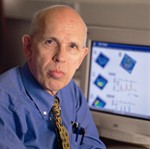The special role of Professor Ole Petersen within Academia Europaea#
As chairperson of the nomination committee and the board he plays a crucial role in the development of Academia Europaea.
World authority to lead School of Biosciences#
19 January 2010One of the most distinguished figures in international biomedical research, Professor Ole Petersen CBE FRS has been appointed the new Director of the School of Biosciences at Cardiff University
 .
.Professor Petersen, who takes up his post on February 1, said: “I was keen to come to Cardiff because I knew the School of Biosciences to be very good scientifically over a wide range of areas, including neuroscience, genetics, biodiversity and ecology. This brings benefits in many areas, including healthcare breakthroughs, biodiversity conservation and the training of the next generations of bioscientists. The challenge for me will be to manage and build on this excellence over such a wide area.”
Professor Petersen made breakthroughs in understanding how calcium ions can trigger a range of events in cells in the body, particularly the pancreas. This has implications for understanding pancreatitis, where over-active enzymes can digest the pancreas itself, and pancreatic cancer, one of the most lethal forms of all cancers. He made headlines when his team at the University of Liverpool were the first to explain how binge drinking can cause pancreatitis.
Research, naturally, is one of his priorities on coming to Cardiff. He said: “There are a substantial number of outstanding and world-leading groups in many areas. I want to bring as many other people as possible up to that standard.”
Plans include the creation of a Scientific Advisory Board for the School, consisting of eminent external figures who can advise on research policy and also promote the School worldwide. Tied in with that will be a drive to raise awareness of excellence at the School. Professor Petersen said: “There are very many exciting things within the School that haven’t always been prominently signposted. I want to create a situation where people know about all the good things that are happening at the School of Biosciences.”
Chair of the European Research Council’s starting grant panel for physiology, pathophysiology and endocrinology, he is keen to develop awareness of European funding at the School. Professor Petersen said: “I think it’s a very good thing for there to be a European-wide body where competitive grants are made purely on the basis of research excellence. We certainly have people at the School, including young researchers looking for starting grants, who are more than capable of winning awards.”
Professor Petersen has had an interest in teaching ever since his early days at the University of Copenhagen where he found himself looking after students who were only a couple of years younger than himself. At Cardiff, he is keen to develop the links between research and teaching.
He said: “It’s sensible that the students should benefit from all the research that is going on. It is still necessary that they know what is already established in the field, but in that context it’s very important for them to know about new discoveries being made at the School.”
Professor Petersen will also maintain his research interests, funded by the Medical Research Council. He will be bringing members of his previous team to Cardiff to work with the team led by Professor Paul Kemp on cell physiology. Having made the breakthroughs in how calcium affects cell behaviour, Professor Petersen now wants to explore the mechanisms causing disease in more detail. The University has invested £500,000 in a new two-photon microscope to support this work.
Professor Petersen’s career has led to many awards, including a Fellowship of the Royal Society and being appointed a Commander of the British Empire in 2008 for his services to science. He has more than 300 academic articles to his name, including 14 published in Nature. He has been cited in the scientific literature more than 16,000 times.
In Cardiff, Ole Petersen will continue to be a Medical Research Council Professor as he was formerly at Liverpool University. He was Vice-President of the Royal Society in 2005-6 and has just completed nine years as Secretary-General of the International Union of Physiological Sciences. The Royal Danish Academy of Sciences and Letters, of which he is a Foreign Member, held a symposium in his honour in 2008.
Any further pages in alphabetic order of their title as created by you.
#
Just click at "Create new page", then type a short title and click OK, then add information on the empty page presented to you (including maybe a picture from your harddisk or a pdf-file by using the "Upload" Button) and finally click at "Save".
...no Data available yet!


